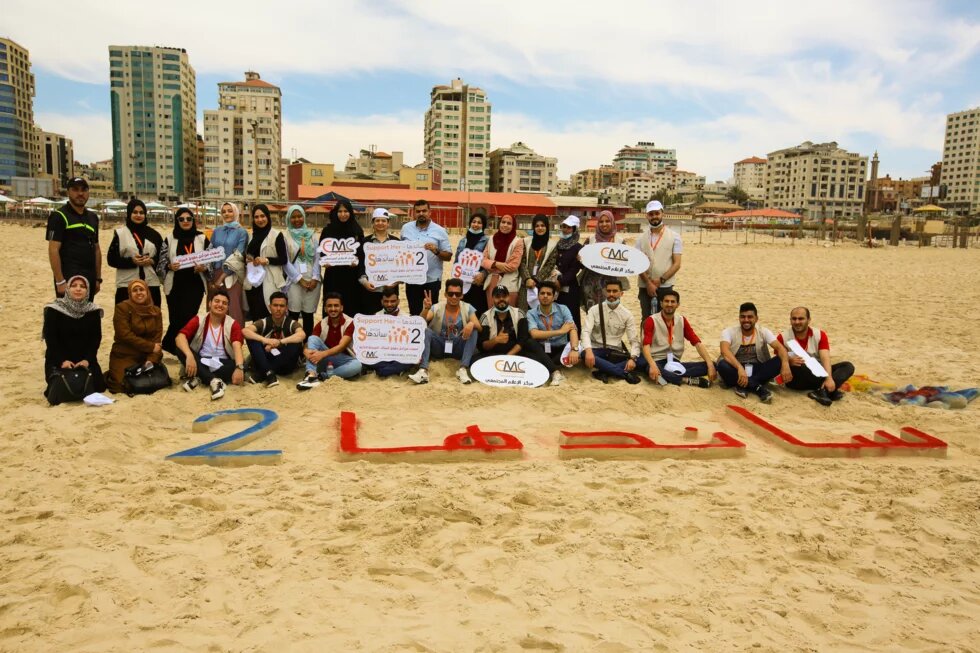

The camp’s activities were carried out during five consecutive days with the participation of 25 young men and women graduates and students from the media and law colleges in the Gaza Strip. The camp aimed at enhancing the capacities and developing the skills of participants on gender issues, women’s rights and combating all forms of discrimination against women. The training also aimed to enhance participants’ training and public speaking skills to prepare them for the second phase, which entails the implementation of 15 educational and awareness-raising sessions for the participants’ peers from both genders on the issues raised in the training. This will be carried out in cooperation with grassroots institutions and universities in all areas of the Gaza Strip.
At the opening of the camp, Ms. Andaleeb Adwan, the director of CMC, explained that: “the first “Support Her” camp that took place last year focused on the basic concepts of gender issues and women’s rights in addition to providing the participants with the necessary skills within this scope. As for the training camp “Support Her 2”, it will aim to develop the participants’ skills as trainers and facilitators who will be able to transfer knowledge and information to their peers, colleagues and community members. Such knowledge will enhance the participation of community members in the efforts to combat gender-based violence, advocate for marginalized groups and raise their awareness on how to obtain their rights”.
The training covered gender concepts, identifying gender roles, in addition to raising the awareness of participants on the importance and impact of social upbringing on gender-based issues. The concept of gender equality was introduced in addition to developing participants’ knowledge on the concepts and implementation mechanisms of gender equality. On the second day of the training, lawyer Hiba Aldanf presented the most important international agreements that guarantee gender justice and reinforce local laws and procedures that ensure the elimination of discrimination against women and consideration of gender issues.
Journalist Suha Sukkar, one of the participants in the camp, emphasized the depth of knowledge she gained during the training, saying: “on the first and second days, the training shed light on the most notable violations to women’s rights in Palestinian community such as the right to inheritance and decision making, despite women’s excellence and distinction in many fields”.
Mohammad Al Natour, a trainer in the field of training for trainers, focused during the three training days on providing the participants with many essential skills necessary for them to become skilled trainers during their prospective work in educating their peers. These include communication and networking skills, using various training methods, preparing training kits and public speaking in a distinctive and effective manner. Within the same context, Al Natour mentioned: “employing body language and nonverbal expressions are one of the key elements that supports trainers in effective communication, not to mention creating a fun and entertaining atmosphere that removes barriers and breaks the ice among all participants”.
Al Natour explains that “the trainer should have the skill of stimulating brainstorming in order to maintain a high level of interaction, engagement and movement in the training in addition to providing the participants with information through various means, such as dividing the participants into groups or using other activities”.
Mohammad Abu Samra, one of the camp’s participants, explained the benefits of the training, saying: “the training refined my knowledge and experience; it provided me with the capability of conducting workshops and educational sessions on women’s rights”.
At the end of the training, the participants showed the skills and abilities that they have acquired through the camp by giving presentations in front of their colleagues and trainers. Each participant gave a five minute presentation as a trainer on topics related to women’s rights and issues. The camp concluded with these presentations that were evaluated by all participants, trainers and CMC staff.
It is important to note that the camp commenced with an educational presentation on the importance of social distancing and the preventative measures to be followed to avoid the spread of the coronavirus. This brief presentation was conducted in cooperation with the Federation of Churches.
The Community Media Center (CMC) is a non-governmental organization in the Gaza Strip that seeks to develop the role of media in addressing community issues. It plays a significant role in promoting the values of democracy, equality, and a culture of human rights focusing on women and youth issues and highlighting them in various media outlets through the adoption of a human rights-based approach.

